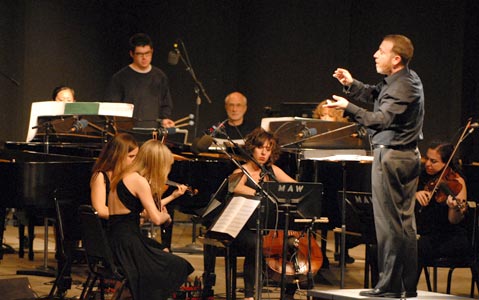Part of Nature, Part of Us
The Ojai Music Festival, featuring the music of Steve Reich. At the Libbey Bowl, Thursday, June 5, and Sunday, June 8.

Although there were many fascinating programs scheduled at this year’s Ojai Music Festival, from the first notes struck on Thursday evening until the last on Sunday, the main focus was on the great American composer Steve Reich. Best known for Music for 18 Musicians and commonly associated with the movement toward aesthetic Minimalism, Reich contains multitudes and continues to express himself in new and surprising ways. His output since the 1960s stands up remarkably well to the kind of close attention given at Ojai, and it was a great pleasure to hear his works, early and late, in the magical Libbey Bowl. Reich’s work manages to be both pleasing-even in large doses-and eminently provocative for reflection on the nature and state of music today.
On Thursday night, the new music group Signal led off the festival with Eight Lines, an orchestral variation on Reich’s Octet. Brad Lubman is an exciting conductor to watch-all angular motions and athleticism. It looked as though he cued every entrance in this dense, complex piece. Nagoya Marimbas, the duo that followed, was played by Adam Sliwinski and Jason Treuting of So Percussion and required no conductor.
Nor did the notorious Four Organs, which concluded the first half of the concert and showed it can still blow away audiences. Made famous by a 1971 performance at Carnegie Hall that is generally considered to be the last great instance of a “scandal” at a classical concert, Four Organs still makes a powerful statement, and leaves listeners with much to think about. The organs of the title are the electronic keyboards known as Farfisas, which have a tone familiar from the classic rock of the 1960s. For this performance, the original Farfisa sound was created by running MIDI keyboards through a laptop. Guided by a single percussionist who plays a pulse in 11/8 meter, the four players explored the possible permutations of just six notes of a dominant-11th chord on E, first short, and then extended over time. Four Organs is one of the great existential statements in modern music, and this performance by So Percussion-Eric Beach, Josh Quillen, Sliwinski, Treuting (synthesizers), and Doug Perkins (maracas)-got every ounce of meaning out of this enigmatic piece.
When the organists embraced the percussionist afterward, congratulating him on the way he persisted in his highly exposed and physically and mentally demanding role, their gratitude further elaborated one of the work’s many charged relationships. Throughout the festival one was continually reminded of the way Reich’s music transforms the traditional patterns of interaction among musicians onstage. From intricate polyrhythms to carefully wrought and delicately timed entrances and exits, these works push ensembles to their limits, and reward them with feelings of intense communal accomplishment.
Daniel Variations, Reich’s commissioned piece in honor of slain journalist Daniel Pearl, is as baroque as Four Organs is stark, yet it never loses the Reich sound or sense of space and time. Some unusual and exciting phasing effects are achieved by the vocalists, who perform without the conventional operatic vibrato. Overall, the impact of the piece, which envelopes the strict, pulsing phrases of Reich’s Minimalist period in a gauzy, shimmering rapture of aspiration, is both powerful and entirely suited to the subject. Reich’s recent style captures something that few composers even dream of-a sheer pleasure in listening that is a part of and yet beyond the realms of both pop and classical.
Drumming, which was performed on Sunday at noon, is the gorgeous, unforgettable masterpiece at the apex of Reich’s early career. More rigorous in its simplicity than Music for 18 Musicians, it was positively transcendent to hear this work played perfectly in the middle of a summer’s day outdoors. Written in the aftermath of a life-changing trip to Ghana, Drumming achieves an honesty and truthfulness that little else in modern art can match. The rhythmic idea that forms the work’s core is translated over the course of its four sections into a huge range of timbres, moving gradually (a lot of what happens in Reich is gradual; in fact, he once wrote an essay called “Music as a Gradual Process”) from tuned bongos to marimbas and voices to glockenspiels, piccolos, and whistling. The integration of African polyrhythms with Western intellectualism, rather than sounding contrived, is seamless, and becomes akin to the natural world in the patient, substantial grace of its beauty. Reich himself participated in the performance, and was joined by Nexus (Bob Becker, Bill Cahn, Russell Hartenberger, and Gary Kvistad), So Percussion, Edward Atkatz, Martha Cluver (soprano and whistling), Caleb Burhans (countertenor), and Sarah Jackson (piccolo). The birds of Ojai and even the wind in the trees seemed to stop to listen to this most unusual and joyous of human expressions.



